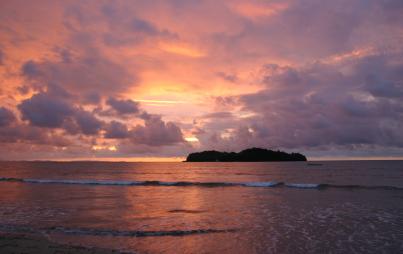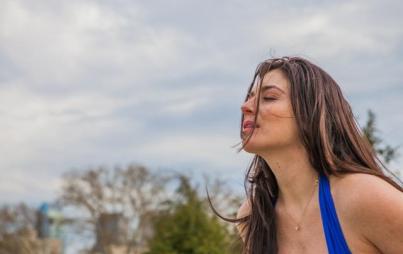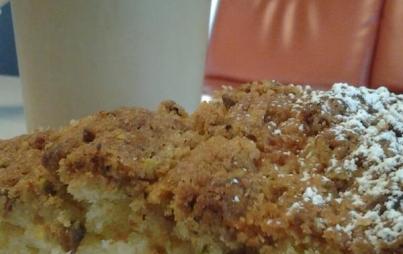
Image Credit: Cedric Buchet
Amanda de Cadenet wants to see the world through the eyes of girls — which is a pretty diverse look at the world, in general. Her project #Girlgaze has grown from an Instagram hashtag to a book (which was inspired by an art installation of #girlgaze photos!), #Girlgaze: How Girls See The World. We chatted with her about the book, the power of women being their authentic selves, and why she doesn't particularly care whether other people like her — and why you shouldn't care, either.
We LOVE how you’ve brought into focus the female point of view with countless projects, including The Conversation and #Girlgaze. Over the course of your career, how have you seen the proverbial “place at the table” for women change?
I’d say the biggest change is that people are finally speaking out about what it’s like to be a woman, and we’re not embarrassed or ashamed to identify as a feminist.
How does having women behind the camera change the way we view women in front of the camera?
It really means that we are not portraying our subjects, girls especially, in one narrative. We are creating balance and providing equal representation of women and all points of view. We need to see the perspective from everyone: men, women, queer people, people of color, non-binary and gender nonconforming individuals — any and all marginalized communities.
#Girlgaze is largely based around social media, Instagram in particular. What sort of shift have you seen since women creatives have been able to interact with each other through these platforms?
Social media is completely responsible for the rise and existence of #Girlgaze. It’s such a powerful communication tool and has done so much in allowing for inclusive representation and visibility, and opens up conversation about all of those subjects that we’ve swept under the rug for so long. There is this move towards inclusivity which is much needed, and I think social media — especially Instagram — has played a big role in that. I’m personally happy to see so many different representations of beauty on the platform, I just hope we continue to recognize that beauty really does come in all shapes sizes and skin tones.
On the creative side, we’ve also been able to discover much more talent than ever before — Instagram provides us access to these artists, since there’s a great balance in gender on the platform. I spend hours scrolling through the #Girlgaze hashtag.
The “male gaze” often involves an infantilization of women, making them into “girls” without their consent. Girlgaze feels like a reclamation of that gaze, making girl a position of power instead of as a subject. What about the words “girl gaze” rings most true for you?
We just launched a digital Zine in which we created a concept around what the term “Girlgaze” actually means, and I think we did a really great job of defining our community. We started with “G”, describing the ultimate Girlgaze girl (our cover star was Willow Smith — an incredible young woman who is a role model in the making), which really can be defined as someone who embodies the following: “I”nclusivity, “R”esistance, “L”eadership, “Gaze”, “A”uthenticity, and the (Z)eitgeist — aka the spirit of this generation.
In living those attributes, we’ve all come together to push back on cultural projections and traditional gender roles through their creativity, and that’s the most important part. By creating this supportive and inclusive community, we’ve re-instilled the notion that girls are powerful — that their minds, their ideas are just as valuable as those that come from men. After taking one look at our community or talking with some of the photographers, I don’t think there is ANY doubt that the female gaze is powerful, smart, engaging, unique and necessary.
The Girlgaze book is so lovely. The photos are striking and inspiring for women of all ages. What was the process of choosing which photos to include?
Thank you. We curated the images through our hashtag #girlgaze, through photos that girls submitted via Instagram. The original curation was actually for our Annenburg exhibition (October 2016). We curated compelling images that highlighted the female experience and how girls see themselves, their space and the world around them. It was really meaningful to provide an open platform for women to share their experiences with us all.
In addition to #Girlgaze: How Girls See The World, we are equally excited about your memoir, It’s Messy: On Boys, Boobs, and Badass Women, which just came out. What do you think people who read it will most be surprised by?
I’ve always been pretty transparent, so I don’t think that anyone will be too surprised. I’m open about the fact that I don’t have all the answers myself, and that I’m just trying to navigate through my own life — it’s very evident in the book that I’m still trying to figure it all out too. I’m just sharing what I feel like I have insight into and what has worked for my own life. I think, factually, it’ll be somewhat surprising. Some of the childhood stories — like, my experiences in juvie - there are the parts of my life that I’ve not shared publicly before. But I think it’s important to understand that negative experiences can often have a profoundly positive effect on people, and will ultimately shape the person you become, and what I hope my readers will take away from It’s Messy.
You have a super prolific career — how do you juggle wearing so many hats, and how do you know when you have a new project you want to start?
I’m a major multitasker — I get bored when I’m doing one thing for too long. Girlgaze allows me to dream up big ideas and many different projects — we’re creating video content, a digital magazine, merchandise, and online classes. And in turn, these projects are providing opportunities for our community, so it’s great for someone like me who can’t sit still for long. My job is to ensure we are creating tangible work for our girls, so there is never a time when I don’t have a new project I want to start.
Who are you most inspired by today?
Women who are authentically themselves. I am constantly in awe of women who are able to remain true to themselves when there is so much to culturally conform to. I also admire women who have survived the unthinkable — those are the women I hold a great respect for.
What advice would you give to young women who are just beginning to find their voice in a chaotic and still patriarchal world?
Be willing to not be liked. It’s not about being liked, it’s about your ideas getting heard. Also, don’t give up, and do your best to find a mentor or a support network. Find someone who can help you navigate the path and the patriarchy because what you’re experiencing is not unusual - someone else has absolutely experienced it — and they can provide you support in those times when you’re about ready to give up.








